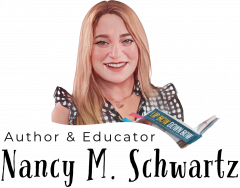Up Bow Down Bow (a child with Down syndrome and his journey to master the cello)
By Susie Garber
Everyone has challenges. The question is not what our challenges are but how we view them and what we do in response to them. Nancy Schwartz along with her co-author April E. Beard, shares her response to challenge in a book that captures the idea of hope and perseverance and finding the beauty in each person. Nancy’s son Alex has Down syndrome and other health problems which make it difficult for him to do many things however, Nancy and her husband and children have always viewed Alex in a positive way and focused on what he can do. The idea of focusing on the positive in each person is what G-d wants and it’s what will make the world a better place.
In her first book Up Not Down Syndrome Nancy shared her journey of giving birth to Alex and discovering what a blessing he is for her family. In this book she and her co-author share how music, the universal language has given Alex a voice in the world.
“Children with varying abilities have much to offer all of us. This book speaks to how parents, families, and communities can support children with diverse capabilities and the joy we can receive in return.” Barbara Bowman, Irving B. Harris Professor, Erikson Institute.
The story of Alex’s musical journey is told in three voices. Nancy, the mom, April, the music teacher, and Alex, the student. In this book the reader witnesses “The triumph managed through a parent’s love and persistence, a teacher’s dedication, a young boy’s desire to learn, and music’s power to transform.” (A Parent’s Guide to Public Education in the 21Century.
In Nancy’s words from the book. “When I first started telling people, even well-meaning friends, “Alex is going to study the cello!” They reacted in one of two ways. Either they smiled and nodded in a way that conveyed the message Poor, delusional Nancy with her unrealistic dreams. Or they said what they were thinking. “Ummm,,, How is that possible?”
I have to admit that, even to me, playing the cello seemed about as likely for someone like Alex to accomplish as a flight to the moon. But I tried not to let m skepticism show. Even along the way, I was not without my doubts. When Alex started cello lessons and still could not take himself to the bathroom, there were moments when I thought this is going to be impossible.
“It was April’s unending belief in my son, her little cello student, that dispelled all these doubts—first mine, then others. Somehow, the rhythm of her teaching wiped away everyone’s disbelief that Alex could achieve the unbelievable. And he has! Through April’s example, I came to see yet again that, when we believe in ourselves and our path, anything is possible. Anything. This has been a continual lesson in my life…”
“At the same time, twelve years later, I’ve come to know that the world doesn’t always view Alex the way I do. Some see his disability—the way Alex cannot talk, cannot walk, cannot feed himself, or use the facilities himself, and stay stuck there.”
Nancy shares that she notices the averted glances but she shares that those who underestimate Alex miss out on the reality that he is someone capable, someone with gifts, someone that can shatter expectations—a person just like any other and at the same time, uniquely and exquisitely himself.”
There was a great rabbi who would stand up for people with disabilities because he said these were people with very high neshamahs (souls).
In this book the reader comes along on the wonderful journey of Alex’s learning the cello and it’s a journey that will inspire everyone to always have hope and to see the positive in every situation.
